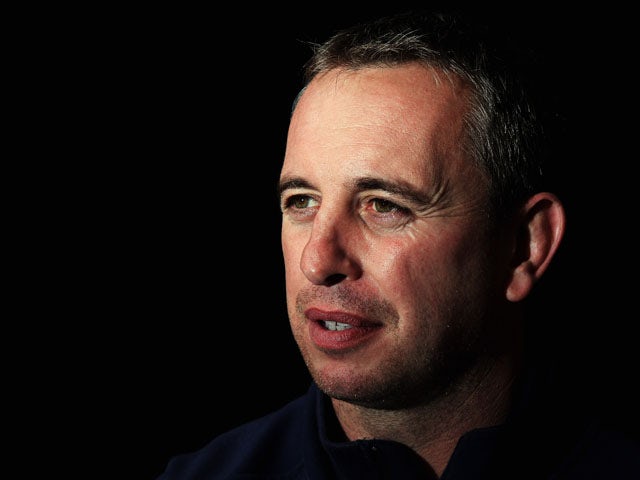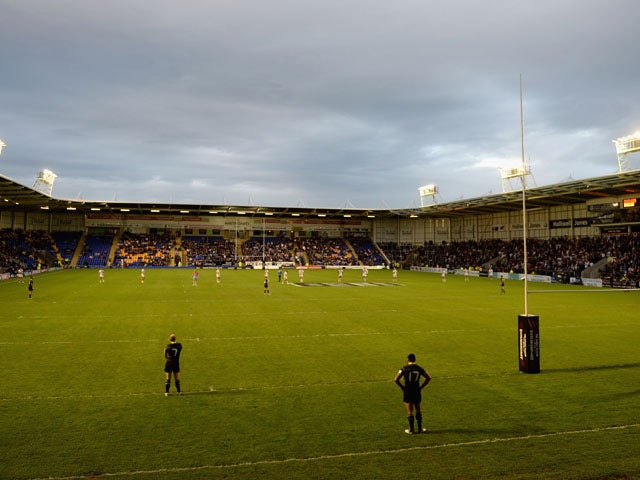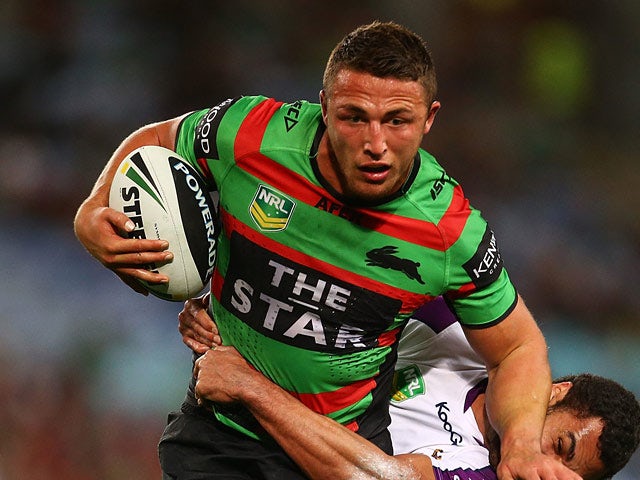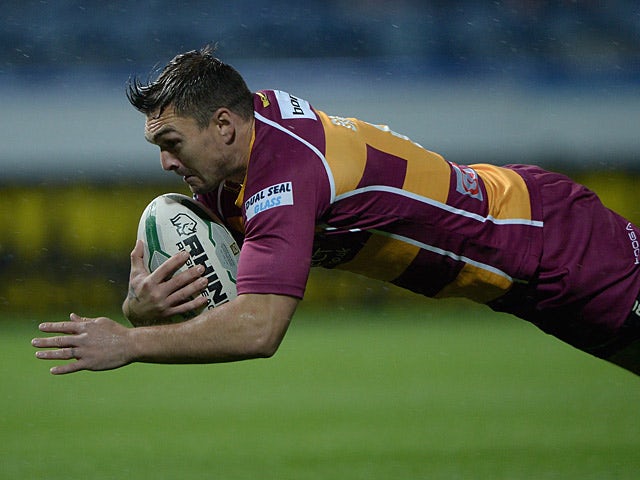The latest leg in a golden decade of British-based international sport gets underway in Cardiff on Saturday.
A long 412 days after London's unforgettable summer of Olympic and Paralympic action came to a spectacular close, the United Kingdom will be at the centre of the elite sporting world once more.
The reputation of rugby league in the UK was severely damaged by its hosting of the World Cup in 2000. Low attendances, which led to huge financial losses for the RFL, were compounded by poor weather and frequent on-field mismatches.
British weather has not improved much in 13 years, but the game is in a much better state of affairs and the tournament's format has been tweaked and retweaked to ensure that the 14th edition of the Rugby League World Cup is a resounding success.
Below, Sports Mole explains the new format, looks at where the games will take place and assesses the teams involved, as well as revisiting the history of this famously inconsistent tournament.
Format:
 © Getty Images
© Getty Images
The number of participating nations, which was lowered from 16 to 10 in 2008 in an attempt to avoid one-side matches, has increased to 14 for this year's tournament. Seventh and ninth-place playoffs have been scrapped as a result. Furthermore, there will be no semi-final qualifier, with a relatively simple group phase being immediately followed by a straightforward knockout involving eight teams.
In groups A and B, each team will play each other once, with the top three progressing to the quarter-finals. Meanwhile, the winners of groups C and D will qualify for the last eight. The teams in groups C and D will also play three matches in the league phase, including one intra-group game each.
Group A: Australia, Fiji, Ireland and England (coached by Steve McNamara, pictured above)
Group B: New Zealand, Papua New Guinea, France and Samoa
Group C: Scotland, Tonga, Italy
Group D: Cook Islands, United States, Wales
Wales play Italy in the first intra-group fixture. Tonga then take on the Cook Islands, before Scotland face the USA.
The winner of Group B will face the winner of Group C at Headingley in the first quarter-final, followed by a clash between the winners of Groups A and D in Wrexham. Group A's runner-up will then meet the third-placed side from Group B at the DW Stadium, before the quarter-final stage is concluded with a match in Warrington between Group B's runner-up and the third-placed side from Group A.
The semi-finals will take place back to back at London's Wembley Stadium on Saturday November 23 during an afternoon that has been dubbed 'The Bit Hit'. Manchester's Old Trafford will host the final seven days later.
Venues:
 © Getty Images
© Getty Images
The official hosting of the tournament is being shared by England and Wales, with group games also taking place in Ireland and France.
England has the honour of staging 20 of the 28 matches. However, the opening ceremony will take place at Cardiff's Millennium Stadium directly before the tournament's first fixture: England vs. Australia.
Wales will play all of their group matches on home soil, with their fixtures taking place at the Millennium Stadium, the Racecourse Ground in Wrexham and the Gnoll in Neath. France will play group games in Perpignan and Avignon, while Ireland's final group match will be at Thomond Park in Limerick.
Nine Super League grounds will be utilised, including the John Smith's Stadium in Huddersfield, Headingley in Leeds, Wigan's DW Stadium, Warrington's Halliwell Jones (pictured above), Langtree Park in St Helens and the Salford City Stadium. Games will also be played at the KC Stadium and Craven Park, making Hull the only place that will hold matches at two different venues.
The Leigh Sports Village, Workington's Derwent Park, the Shay in Halifax, the Memorial Stadium in Bristol and Rochdale's Spotland are the other venues that will witness group-stage action.
Tournament history:
The first six World Cups, which took place between 1954 and 1974, consisted of just four nations - New Zealand, Australia, France and Great Britain. Each team played each other twice, before the top two sides contested a final.
It was a five-nation tournament in 1975 when Great Britain was divided, allowing England and Wales to compete individually. This change coincided with the dramatic restructuring of the event, which became a hostless eight-month Test series in which teams played each other home and away.
Britain reunited and the event briefly returned to its original format in 1977, but, after Papua New Guinea entered the picture, the next two World Cups became five-team Test series again. However, whereas the 1975 championships took eight months to complete, these two lasted nearly three years apiece.
England have competed as a nation in their own right at every one of the three tournaments since 1995. That year saw the competition expand to 10 teams, allowing the likes of Fiji, Tonga and South Africa to make their debuts.
Australia have lifted the World Cup on nine occasions, including winning six in a row between 1975 and 2000. However, the Kangaroos lost their crown on home soil in 2008, suffering a 34-20 loss to first-time winners New Zealand in the final.
Great Britain have been world champions on three occasions, but no side from the Northern hemisphere has triumphed since 1972.
This year's contenders:
England
Best odds: 8/1
Although England are the third favourites to win the tournament according to the bookmakers, a home victory is considered a real long shot due to the emphatic superiority of arch rivals Australia.
The Kangaroos have beaten England in each of their last five meetings in the Four Nations, as well as thrashing them 52–4 in the group stages of the 2008 World Cup.
However, England, captained by 2012 Rugby League World Golden Boot winner Kevin Sinfield, are a team full of Super League stars. Their 24-man squad also includes Sydney-based siblings George Burgess, Tom Burgess and Sam Burgess (pictured below), who is considered by many to be among the best forwards on the planet.
England's preparations for the tournament have been far from ideal. Three days after losing 15-14 to Italy in a warm-up fixture, Gareth Hock was removed from their squad following "serious breaches of team discipline". Hock has been replaced by Brett Ferres.
 © Getty Images
© Getty Images
Australia
Best odds: 2/5
Without doubt, Australia are the side to beat. New Zealand showed that they are beatable by toppling them in the final of the last World Cup. However, the Kangaroos responded to that heartbreaking defeat by winning their next six games against the Kiwis by an aggregate score of 158-62.
New Zealand
Best odds: 4/1
The defending champions cannot be ruled out. Their squad contains many individuals who are used to competing against Australia's best in the NRL week in week out, including Sonny Bill Williams, who played a starring role in the Sydney Roosters' title triumph last season.
Scotland
Best odds: 1000/1
Scotland are not going to win the World Cup, but they could spring a surprise during the group stage. Playing two of their fixtures just over the border in Cumbria, they should get plenty of support, especially as three members of their squad - Callum Phillips, Brett Carter and Brett Phillips - play for Workington Town. Their squad also includes 2013 Super League Man of Steel Danny Brough (pictured below).
 © Getty Images
© Getty Images
Odds of the rest: Samoa - 175/1, Tonga - 200/1, Fiji - 250/1, France - 400/1, Papua New Guinea 529/1, Wales - 1000/1, Ireland 1000/1, Cook Islands - 1500/1, Italy - 2000/1, USA 5000/1.







